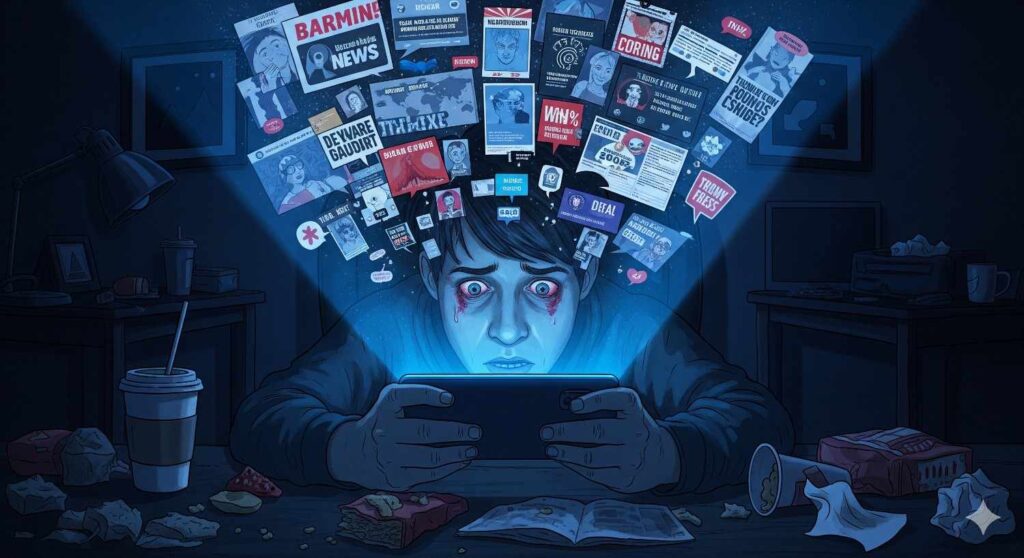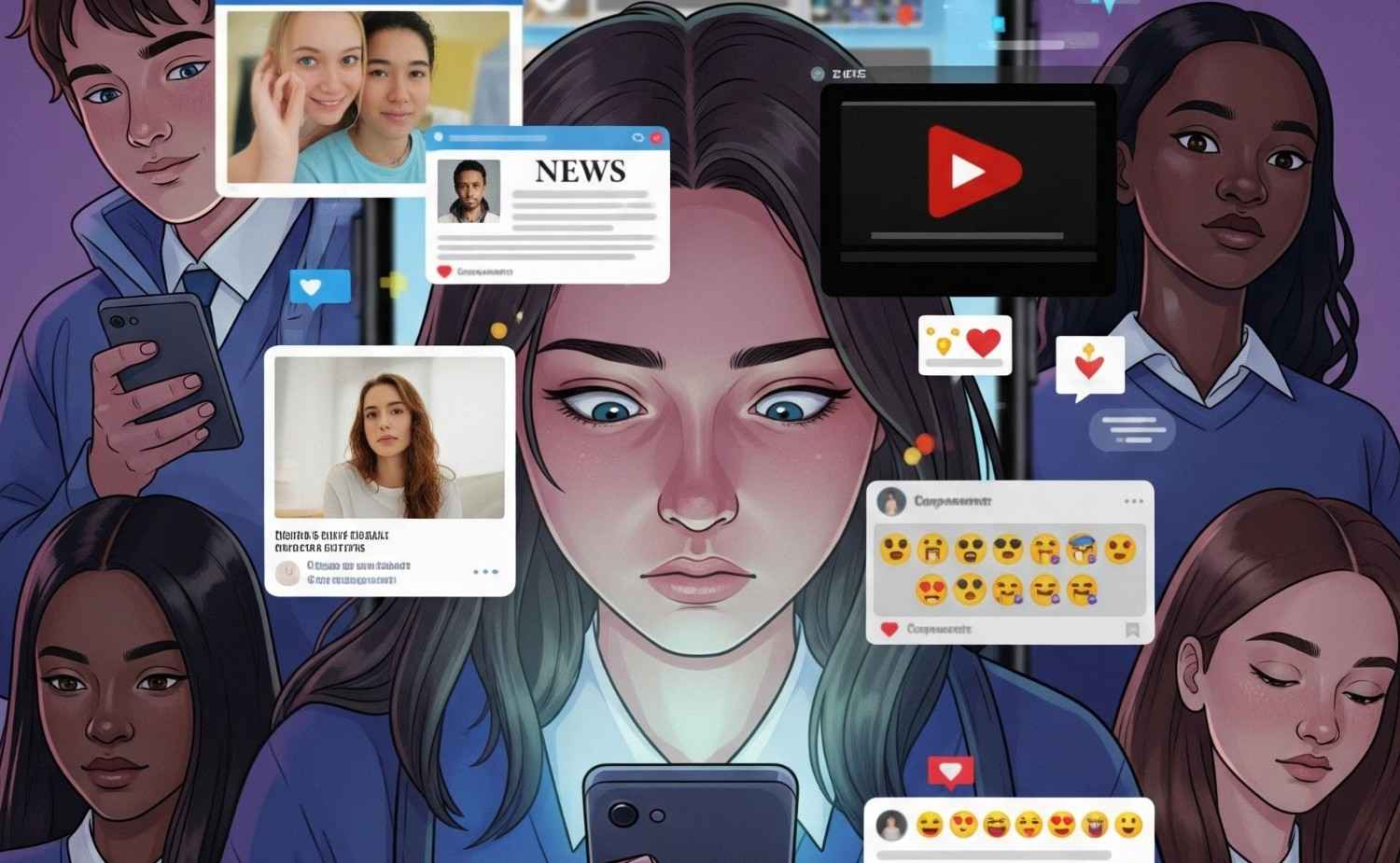In today’s digital world, social media scrolling has become a daily routine. The moment we wake up, we grab our phones, and before sleeping, we end the day with reels or posts. At first, it feels like a harmless way to pass time, but slowly this habit is damaging our brain. Experts call this the doom scrolling effect and brain rotting. Is social media harming your brain? Explore the doom scrolling effect and brain rotting, its psychological and physical effects, and ways to regain focus.
Let’s break it down in simple words—what doom scrolling is, how it harms our brain, and what we can do to stop it.
What is Doom Scrolling?
Doom scrolling is the habit of endlessly going through reels, news, or posts without control. Whether it’s negative news or random entertainment, we just keep scrolling. At first, it feels like we are staying “informed” or entertained. But the truth is, our brain gets overloaded with shallow and overstimulating content. That’s when brain rot begins.
The Link Between Doom Scrolling and Brain Rotting
Brain rot means a slow decline in mental sharpness caused by too much low-quality, addictive content. Here’s how the doom scrolling effect and brain rotting are connected:
Dopamine Addiction – Every reel, like, or notification gives a quick dopamine hit. The brain keeps craving more.
Shorter Attention Span – Long reading or deep focus feels difficult because the brain is trained for quick content.
Mental Fatigue – Too much scrolling makes the mind tired and foggy.
Negativity Overload – Constant bad news and controversies increase anxiety and negative thinking.
Sleep Problems – Late-night scrolling keeps the brain active and disturbs sleep.
Signs You Might Have Brain Rot
It’s not always obvious, but if you notice these signs, you might be trapped in doom scrolling:
Difficulty focusing on studies or work.
Feeling restless without your phone.
The day feels incomplete without checking reels or posts.
Creativity and problem-solving feel weaker.
Stress or anxiety increases after long scrolling sessions.
Telling yourself “just 5 minutes” but ending up scrolling for hours.
Psychological Effects of Doom Scrolling
Doom scrolling doesn’t just waste time—it deeply affects mental health:
Anxiety and Depression – Constant bad news makes the world look darker than it is.
Comparison Stress – Seeing other people’s “perfect lives” online makes you feel less.
Chronic Stress – Too much negativity keeps the brain in tension mode.
Digital Burnout – After long scrolling, you feel drained with no motivation left.
Physical Effects of Brain Rot
The doom scrolling effect and brain rotting also harm the body:
Eye Strain – Long screen time causes pain, headaches, and blurry vision.
Poor Posture – Looking down at the phone leads to neck and back pain.
Sleep Issues – Blue light from screens disturbs natural sleep.
Low Productivity – Hours wasted scrolling replace healthy habits like exercise or reading.
Why Our Brain Loves Scrolling (But Pays Later)

Our brain is naturally wired to seek novelty. Every swipe shows something new, giving a reward in the form of dopamine. That’s why scrolling feels good in the moment .But over time, this weakens memory, attention, and self-control. This is the dangerous cycle of the doom scrolling effect and brain rotting—short-term pleasure, long-term harm.
Read more about Social Median Impact.
How to Break Free from Doom Scrolling
The good news? Brain rot is not permanent. With small lifestyle changes, you can protect your brain:
Set App Timers – Limit daily usage of social media apps.
Digital Detox – Keep certain hours of the day completely phone-free.
Replace Scrolling with Reading – Read books, blogs, or long articles.
Turn Off Notifications – Stop constant distractions.
Do Real-Life Activities – Exercise, hobbies, or spend time with friends.
Follow the 20-20-20 Rule – Every 20 minutes, look at something 20 feet away for 20 seconds to relax your eyes.
Final Thought
The doom scrolling effect and brain rotting are serious problems in today’s world. What feels like harmless scrolling actually steals our focus, creativity, and peace. We don’t need to quit social media completely, but we must use it mindfully. Technology should be in our control, not the other way around. So take a step today—put your phone down, protect your brain, and reclaim your focus. Because every scroll may give you a moment of fun, but it can also take away hours of clarity from your life.
FAQ :
1. What exactly is “doom scrolling”?
Doom scrolling is the habit of compulsively and continuously scrolling through negative, alarming, or distressing news and content on social media or news feeds, even when that content is saddening, disheartening, or anxiety-inducing. It often feels difficult to stop, even when you know it’s bad for your mental state.
2. What is meant by “brain rot”?
“Brain rot” is an informal term used to describe the perceived negative cognitive effects of excessive, passive social media consumption. It refers to symptoms like shortened attention span, difficulty concentrating on longer tasks, mental fog, and a reduced ability to process complex information—as if the brain’s “muscle” is weakening from lack of deep focus.
3. Besides mental effects, what are the physical effects of endless scrolling?
The constant stimulation and blue light from screens can lead to several physical issues, including:
Poor Sleep Quality: Disruption of your natural sleep cycle (circadian rhythm), making it harder to fall asleep and get restorative rest.
Eye Strain and Headaches: Prolonged focus on a bright screen can cause digital eye strain, blurred vision, and headaches.
Physical Inactivity: Spending long periods scrolling often means less time moving, which can contribute to neck and back pain, among other issues.
4. Why is it so hard to stop scrolling even when I want to?
Social media platforms and content are designed to be highly engaging. They utilize variable rewards (you don’t know what you’ll see next) and infinite scroll features that trigger dopamine releases in the brain. This creates a feedback loop similar to a slot machine, making the behavior addictive as your brain seeks the next piece of engaging content.
5. How can I break the cycle of doom scrolling and regain my focus?
You can regain control by implementing small, consistent changes:
Set Time Limits: Use built-in phone apps or timers to allocate specific, short periods for social media.
Curate Your Feed: Unfollow accounts that cause stress or anxiety and mute triggering keywords.
Create Tech-Free Zones: Ban phones from the bedroom and the dinner table.
Replace the Habit: When you feel the urge to scroll mindlessly, try a different activity like reading a book, listening to a podcast, or a short meditation to consciously redirect your focus.

